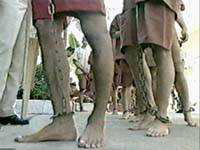 On 29th October 1996 Thailand acceded to the International Convention on Civil and Political Rights (ICCPR) thereby standing with the countries of the world binding themselves to observe just and civilised standards of behaviour. Ten years later
On 29th October 1996 Thailand acceded to the International Convention on Civil and Political Rights (ICCPR) thereby standing with the countries of the world binding themselves to observe just and civilised standards of behaviour. Ten years later Article 7 of the Convention defines that “No one shall be subjected…to cruel, inhuman or degrading treatment or punishment.” Binding a human being in chains is cruel, inhuman and degrading treatment and yet its practice continues in Thai jails. This is especially the case in the case of male prisoners condemned to death who are shackled permanently. The shackles are welded in place on the legs of the prisoners and are removed only on the death or pardon of the prisoner.
Consider the reality of the practice. The chains can weigh as much as 5 or 6 kilograms, although a timely bribe may achieve a lighter load. The chain is permanently in place and prisoners must wear only the lightest clothing which can be passed through the small gap between flesh and metal to bath or change clothing. The metal scratches and tears the skin leading to ulceration and infection. Exercise. prescribed as a necessity of humane prison conditions, becomes impossible.
The first time in Thailand that I knew of chaining was on hearing the rhythmic clink of chains and without even looking, I realised what the sound meant, a chain gang walking at the edge of the road. I had thought that such a practice had gone with the disappearance of slavery and the reform of prison systems. That was over thirty years ago. Today you can see men in chains in the corridors of the Bangkok Criminal Court. Where is the presumption of innocence when a prisoner bound in chains appears before a court?
Fierce animals are chained, and even that is wrong. I have seen dogs, elephants, monkeys chained, and men. In all cases it is cruel, in the case of men it is inhuman and degrading. Once a prisoner, who had just arrived in Bang Kwang prison was shackled with chains still stained with the blood of a man who had been executed in the same chains a few hours before.
It is not that
When asked about the condemned continuation of shackling the Corrections Department recently replied that the prisons are NOT YET READY to fulfil
In condemning the practice of shackling UCL is not rejecting punishment. A condemned prisoner must be punished, but not in an inhuman manner. Over 60 years ago the
No comments:
Post a Comment